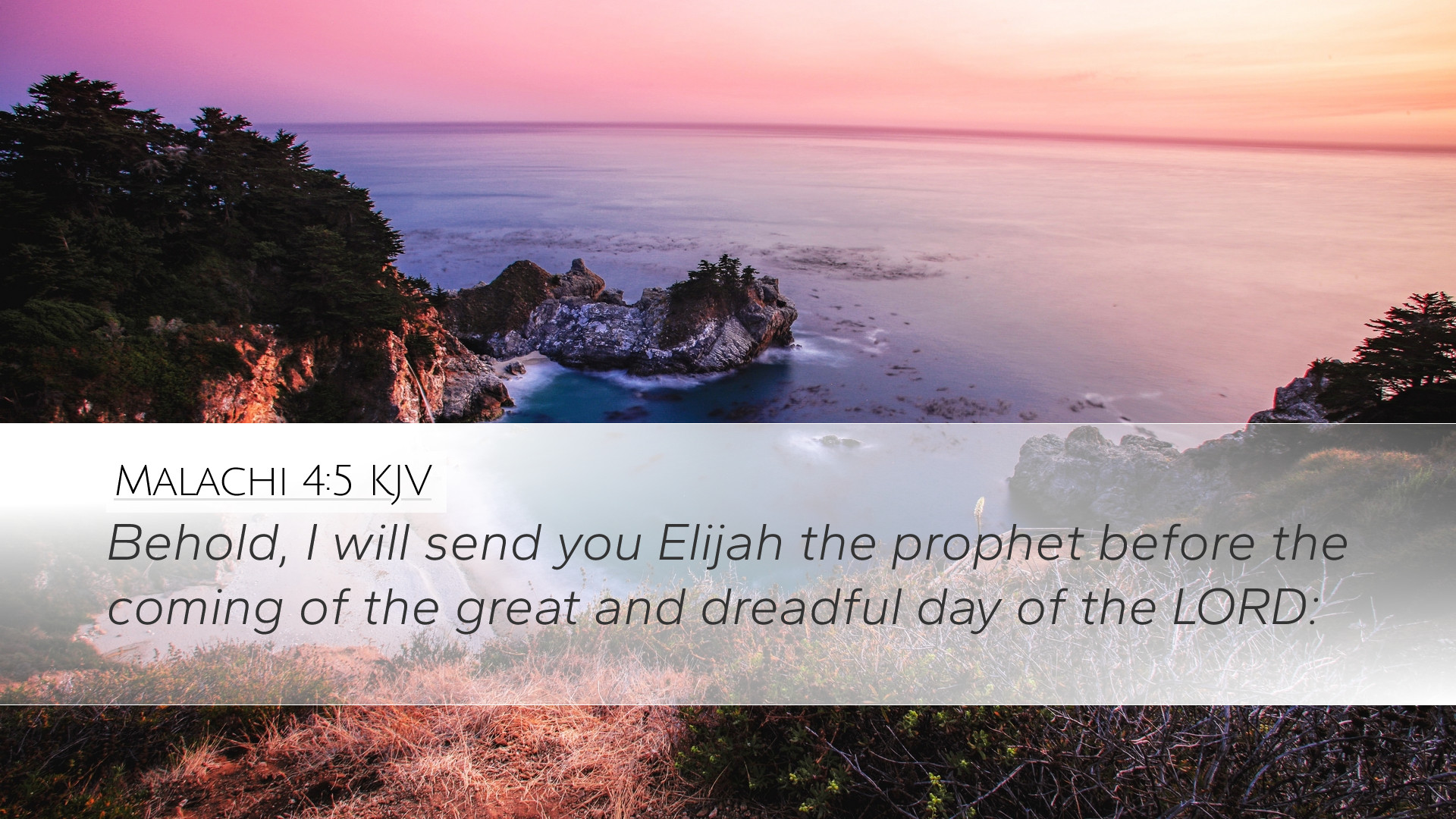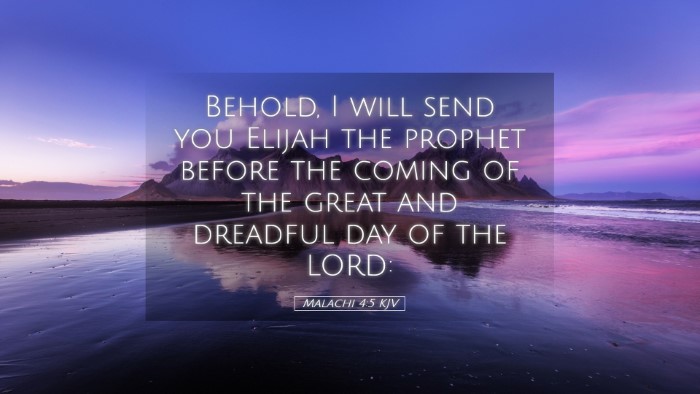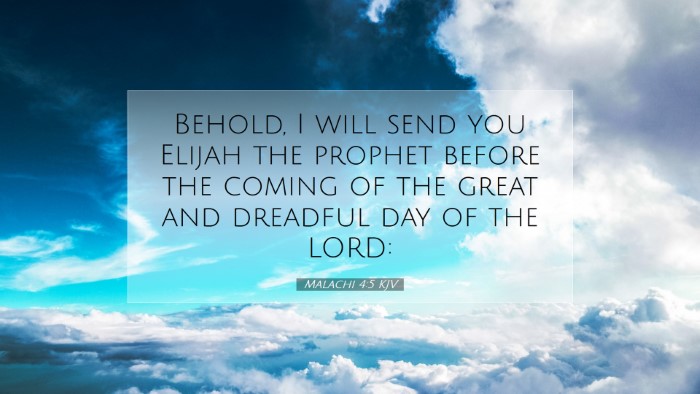Old Testament
Genesis Exodus Leviticus Numbers Deuteronomy Joshua Judges Ruth 1 Samuel 2 Samuel 1 Kings 2 Kings 1 Chronicles 2 Chronicles Ezra Nehemiah Esther Job Psalms Proverbs Ecclesiastes Song of Solomon Isaiah Jeremiah Lamentations Ezekiel Daniel Hosea Joel Amos Obadiah Jonah Micah Nahum Habakkuk Zephaniah Haggai Zechariah MalachiMalachi 4:5
Malachi 4:5 KJV
Behold, I will send you Elijah the prophet before the coming of the great and dreadful day of the LORD:
Malachi 4:5 Bible Commentary
Commentary on Malachi 4:5
Verse Text: "Behold, I will send you Elijah the prophet before the coming of the great and dreadful day of the Lord."
Malachi 4:5 serves as a profound bridge between the Old and New Testaments, holding essential prophetic and eschatological significance, which has provoked much theological reflection. The coming of Elijah is keenly anticipated and interpreted in various ways in the biblical narrative.
Introduction to the Prophet Elijah
Elijah is perhaps one of the most significant prophets in Israel's history. Known for his fierce loyalty to Yahweh, his confrontation with King Ahab, and the dramatic contest with the prophets of Baal on Mount Carmel, Elijah's life illustrates the struggle and triumph of true faith in a rebellious age.
The Theme of Preparation
Malachi's prophecies are steeped in the theme of preparation for the Lord’s coming. This particular verse highlights the critical nature of divine preparation in the context of God’s impending judgment and restoration.
Insights from Matthew Henry:
Henry underscores the figurative implication of Elijah's return, indicating that it symbolizes not just the literal prophet, but the spirit and power of prophetic ministry. He draws attention to the necessity for hearts to be turned in anticipation of the coming of the Lord. Elijah’s role, therefore, is seen as one that prepares the way for a great revelation of God’s glory and justice.
Insights from Albert Barnes:
Barnes comments on the prophetic nature of Malachi’s statement, noting that the coming of Elijah would indicate a time of spiritual awakening and renewal. He emphasizes the ‘great and dreadful day of the Lord’ as a pivotal time and asserts that the true essence of Elijah’s prophetic mission is one of reconciliation — a call to return to faithfulness and covenant relationship with God.
Insights from Adam Clarke:
Clarke elaborates on the eschatological implications inherent in the text, linking Elijah's return with themes seen in the New Testament, particularly in the ministry of John the Baptist. He cites the New Testament references where Jesus identifies John as the Elijah who was to come, linking the fulfillment of Malachi’s prophecy directly to the mission of Christ and His forerunner.
Eschatological Significance
The phrase "the great and dreadful day of the Lord" emphasizes the dual nature of divine intervention: it is a day of judgment and a day of blessing. In the evangelical interpretation, this is understood as the second coming of Christ when final judgment will be executed.
Reflection on the "Great Day"
- Judgment: The day brings a solemn warning about the seriousness of sin and the authority of God's justice.
- Hope: For the faithful, it is also a day of restoration and culmination of God's redemptive plan.
The Call for Spiritual Renewal
In view of Malachi 4:5, it is vital for contemporary followers of Christ, including pastors and theologians, to reflect upon their own lives and ministries. The preparation required echoes throughout Scripture and remains a pertinent call today.
Applying Malachi 4:5 in Today’s Context
This prophetic call serves as a reminder for spiritual vigilance among the church. It challenges leaders to foster a culture of repentance and preparation among congregants.
Key Applications:
- Embracing the prophetic call to turn hearts towards God.
- Encouraging unity and reconciliation in a divided world.
- Teaching about the anticipation of Christ’s return and the reality of final judgment.
Conclusion
Malachi 4:5 is not merely an ancient prophecy; it is an ongoing invitation to engage with God's redemptive story. As we understand the role of Elijah and the significance of the great day, the call remains urgent for each generation to prepare the way for the Lord. Emphasizing repentance, the need for heart transformation, and looking towards the coming of Christ, artists and community leaders alike can embody the essence of this ancient message for contemporary believers.
In summary, the insights offered by Matthew Henry, Albert Barnes, and Adam Clarke create a multi-faceted understanding of Malachi 4:5, urging both historical and modern readers to reflect on their pursuit of holiness in anticipation of God's promises.


